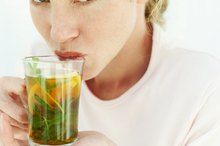What does fact checked mean?
At Healthfully, we strive to deliver objective content that is accurate and up-to-date. Our team periodically reviews articles in order to ensure content quality. The sources cited below consist of evidence from peer-reviewed journals, prominent medical organizations, academic associations, and government data.
- Linus Pauling Institute: Magnesium
- Office of Dietary Supplements: Magnesium
- Journal of Toxicology: The Benefits and Risks of Consuming Brewed Tea: Beware of Toxic Element Contamination
- Journal of Toxicology: The Benefits and Risks of Consuming Brewed Tea: Beware of Toxic Element Contamination
- HealthAliciousNess.com: Top 10 Foods Highest in Magnesium
- MedlinePlus: Green Tea
- MedlinePlus: Black Tea
The information contained on this site is for informational purposes only, and should not be used as a substitute for the advice of a professional health care provider. Please check with the appropriate physician regarding health questions and concerns. Although we strive to deliver accurate and up-to-date information, no guarantee to that effect is made.
Teas High in Magnesium
You need magnesium for forming DNA and proteins, creating strong bones and keeping your nerves and muscles, including the heart, functioning properly. Men need at least 420 milligrams per day, and women need at least 320 milligrams per day for good health. Tea is one source of magnesium, but it isn't typically high in the mineral.
Magnesium in Tea
Tea does contain magnesium, but you'd have to drink quite a bit to get a significant amount. For a food to be considered high in a nutrient, it should have 10 percent of the daily value per serving. According to a study published in the Journal of Toxicology in 2013, drinking 4 cups of brewed tea provides 5 percent of the DV for magnesium.
Type of Tea
Oxalic Acid in Tea
Learn More
It doesn't necessarily matter which type of tea you drink when it comes to magnesium content. A tea bag contains roughly 2 grams of tea, which translates to about 2 milligrams of magnesium per bag, or less than 1 percent of your daily needs.
Absorption Considerations
Unless you choose decaffeinated versions, these teas also contain caffeine, which can increase the amount of magnesium that leaves the body in your urine.
Better Sources of Magnesium
Lapacho Tea Benefits
Learn More
Many people don't drink enough tea to significantly impact magnesium levels either due to its magnesium content or the effect of the oxalates and caffeine it can contain.
Related Articles
References
- European Chemical Bulletin: Comparison of Magnesium Amount in Black, Green, Fruit and Herbal Teas
- Linus Pauling Institute: Magnesium
- Office of Dietary Supplements: Magnesium
- Journal of Toxicology: The Benefits and Risks of Consuming Brewed Tea: Beware of Toxic Element Contamination
- HealthAliciousNess.com: Top 10 Foods Highest in Magnesium
- MedlinePlus: Black Tea
- Rosanoff, A., Weaver, C. M., & Rude, R. K. (2012). Suboptimal magnesium status in the United States: are the health consequences underestimated?. Nutrition Reviews, 70(3), 153-164.
- Dupont, C., Campagne, A., & Constant, F. (2014). Efficacy and safety of a magnesium sulfateârich natural mineral water for patients with functional constipation. Clinical Gastroenterology and Hepatology, 12(8), 1280-1287.
- D'Angelo, E. K., Singer, H. A., & Rembold, C. M. (1992). Magnesium relaxes arterial smooth muscle by decreasing intracellular Ca2+ without changing intracellular Mg2+. The Journal of Clinical Investigation, 89(6), 1988-1994.
- Sojka, J. E. (1995). Magnesium supplementation and osteoporosis. Nutrition Reviews, 53(3), 71-74.
Writer Bio
Based in Massachusetts, Jessica Bruso has been writing since 2008. She holds a master of science degree in food policy and applied nutrition and a bachelor of arts degree in international relations, both from Tufts University.









